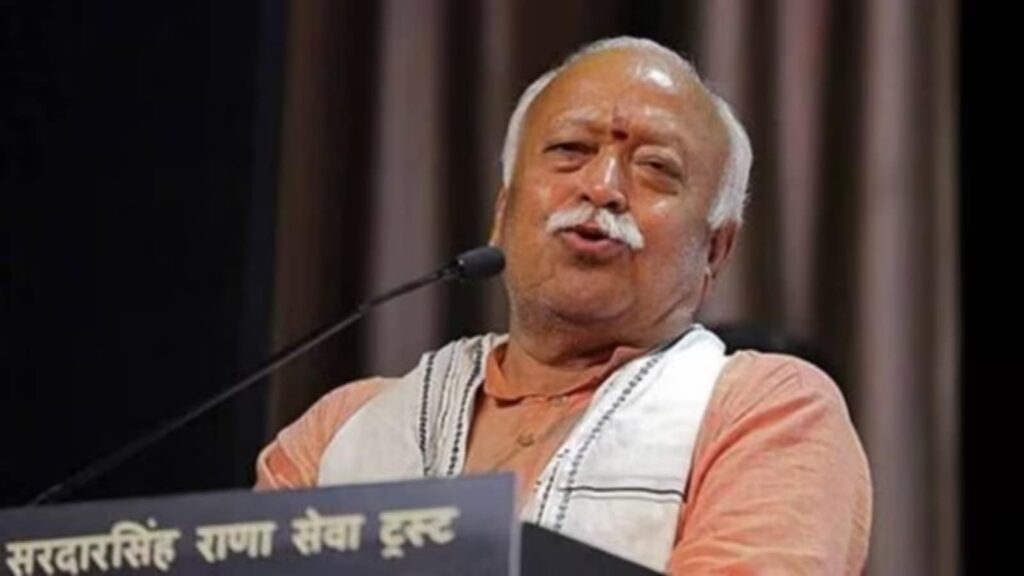In its bid to reach out to “eminent personalities” and familiarise them with the Sangh, the RSS is likely to invite representatives of key Opposition parties to a three-day lecture series to be addressed by RSS chief Mohan Bhagwat, starting August 26.
“We are inviting people from all sections of society, communities and ideologies apart from various sectors of the economy. We are also reaching out to the Opposition parties for participation,” said RSS publicity in-charge Sunil Ambekar.
Sources in the Sangh, however, said it was unlikely that leaders such as Leader of Opposition Rahul Gandhi or Congress Parliamentary Party chairperson Sonia Gandhi would be invited. “We are reaching out to those who keep in touch with us or have a working relationship with us. There is no point trying to get those who will not entertain our invitation,” said an RSS functionary.
Sources said the Sangh would also invite prominent personalities from the minority community and diplomats from close to two dozen embassies. As many as 17 categories and 138 sub-categories, ranging from social to religious to economic and security, have been formulated by the Sangh to invite personalities.
The RSS held a similar conference in 2018, where Bhagwat spelt out the organisation’s thoughts. While the 2018 event was organised in Delhi alone, this time similar conferences will be organised in Bengaluru, Kolkata, and Mumbai till February as a part of the Sangh’s larger outreach programme in its centenary year.
According to Ambekar, the lectures will explore the RSS’s role and experiences over the past 100 years, as well as the areas where the Sangh and its volunteers “should move forward” in the future. There will also be discussions on the RSS’s views on the “five transformations (panch parivartan)” and the expected participation of society in these efforts.
“There will be a focus on how India, progressing rapidly on the path of development, can fulfil its rising hopes and aspirations, with contributions from RSS volunteers. It will be emphasised that if India is to move toward new horizons, it must do so based on its own values and inner strength. There will be a critical look at colonial standards of development that originated during the period of subjugation, and discussions on how to bring forth the vast untapped potential of Indian society,” he said.
Story continues below this ad
Topics of national and societal importance in the present context, as well as India’s global role, will also be addressed. The third day of the event will see Bhagwat fielding questions from the invitees.
In 2018, Bhagwat’s lecture series, titled Bharat of Future, clarified the RSS’s stand on a range of issues such as homosexuality, cow vigilantes, reservation, inter-caste marriages and population policy. The lectures were part of an outreach to clarify the Sangh’s position, counter criticism, and emphasise that its vision of Hindutva is “all-encompassing” and not anti-minority or sectarian.
Bhagwat had concluded by calling for all communities to understand the RSS through dialogue, not prejudice, urging society to work together for the nation’s future. The lectures had then been noted for their conciliatory tone on contentious issues and apparent willingness to promote social unity and reformative debates within both RSS and Indian society.
At a press conference on Tuesday, Ambekar said over the course of the year, more than 1,000 seminars and discussions would be held across the country, involving senior RSS functionaries. The Sangh Sarkaryavah (RSS general secretary), Dattatreya Hosabale, is also expected to participate in some of these events.
Story continues below this ad
Ambekar emphasised that in its 100-year journey, the Sangh always tried to reach every section of society and convey that its ideology is not separate but rooted in India’s established traditions. Ambekar said the RSS’s vision was to work together with everyone for the progress of the nation and that the organisation wants the entire country to move forward together in this journey of development. Under initiatives such as Atmanirbhar Bharat, RSS volunteers were playing participatory and supportive roles in various sectors, he added.


